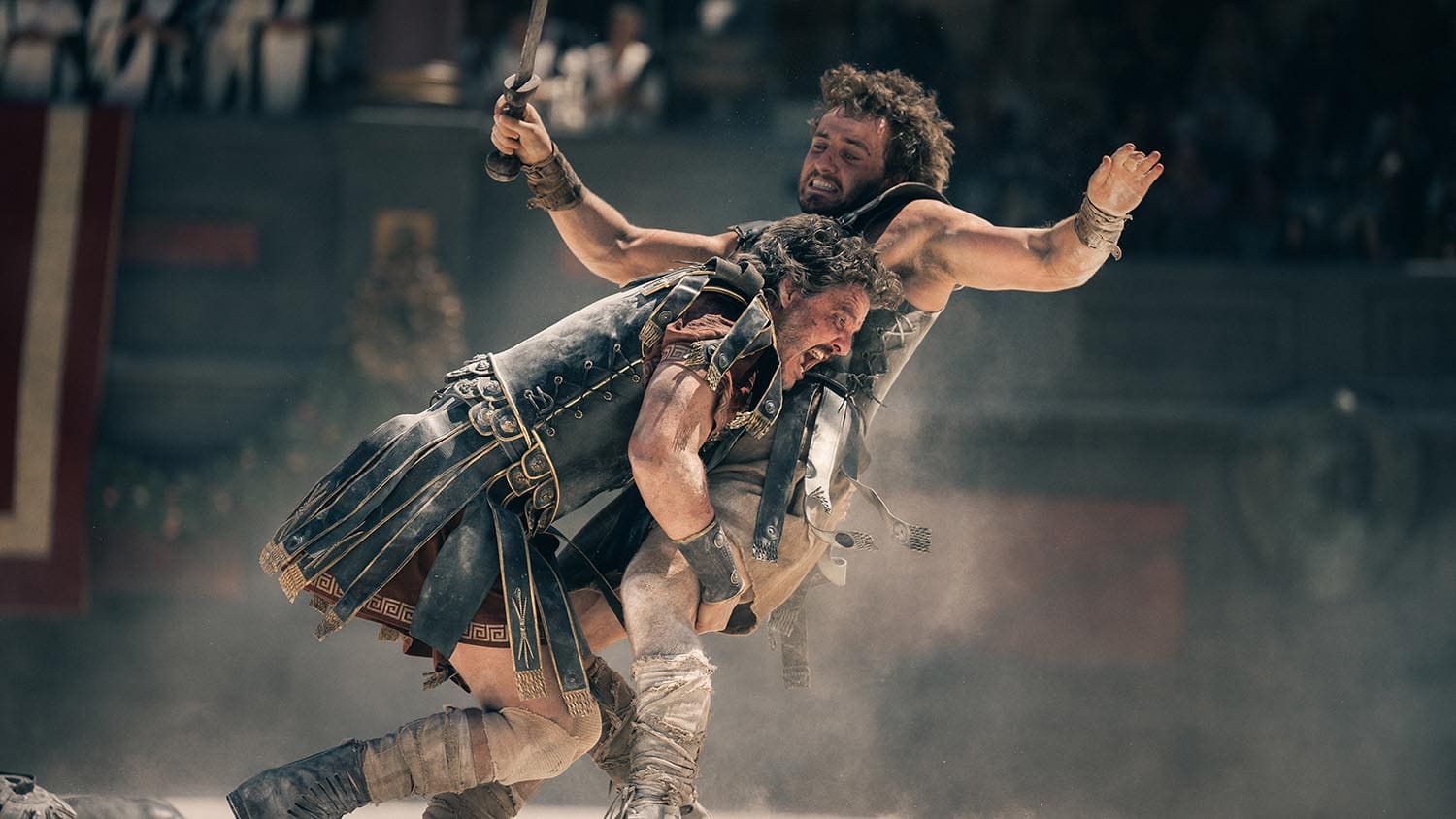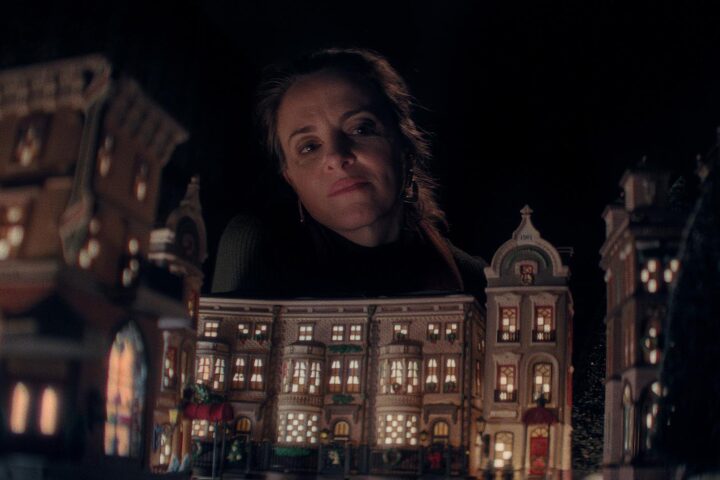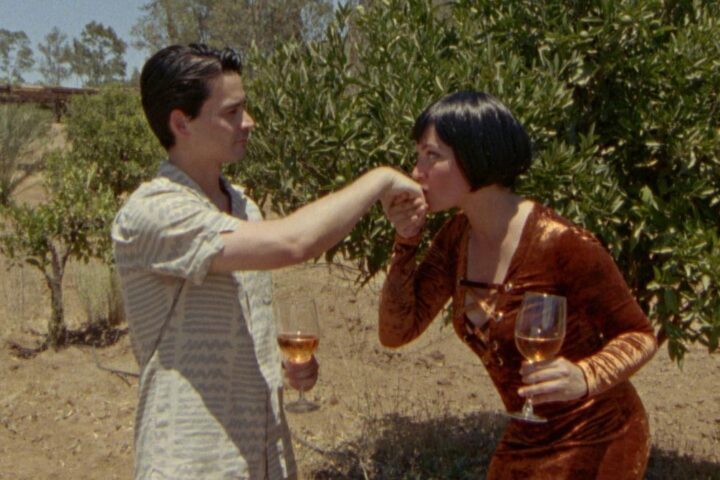Ridley Scott’s 2000 Oscar-winning epic Gladiator epitomizes the director’s approach to historical drama. A considerable level of research is brought to bear for the production design while the story itself approaches history with such flippant disregard for the truth that the film resembles a more serious version of Monty Python’s period satires.
The film’s long-gestating sequel veers away from its predecessor’s ludicrous ending foretelling Rome’s return to republicanism in the wake of Emperor Commodus’s death, sticking closer to the historical reality of Rome falling into a power vacuum that made the emperor of Rome one of the highest-risk occupations in human history. But in every other respect, Gladiator II, which pick up nearly as many years after the events of the original as the time separating the two releases, tilts even further into absurdity, often bordering on outright comedy.
In the broadest of strokes, Gladiator II essentially replicates the story of the first film, albeit with the protagonist shifted from the deceased Maximus to Lucius (Paul Mescal), son of Commodus’s sister, Lucilla (Connie Nielsen). Lucius was sent by Lucilla far from Rome after the death of her brother, to protect him from the murderous plots of would-be emperors.
Lucius comes of age under a new name in the African province of Numidia, only for an invasion by Roman general Marcus Acacius (Pedro Pascal) to leave him widowed and returned to the capital as a slave. There, he becomes the star gladiator of entertainment broker Macrinus (Denzel Washington), a more sinister version of Oliver Reed’s more benign slave turned magnate from the first film. Wielding Lucius’s grief and desire for vengeance to put his own schemes into action, Macrinus begins to ingratiate the pair amid the debauched court of co-regent twins Geta (Joseph Quinn) and Caracalla (Fred Hechinger).
As Lucius, Mescal gives a performance that recalls Russell Crowe’s no-nonsense Maximus from Gadiator, right down to speaking in some of the same cadences and inflections. But where Maximus had a stoic dignity befitting his legionnaire training, Lucius is a volcano of unrestrained, unreasoning rage, the product of a lifetime of loss.
In the scenes that are most narrowly focused on Lucius and his quest to kill Acacius, the sequel is more closely tied to the spirit of the first film, questioning the value of revenge while largely upholding the virtue of the man seeking it. Lucius doesn’t project the charismatic authority that Maximus did, but he still controls his fellow gladiators in the arena through sheer belligerent force that marks him as a man so possessed that he’s invulnerable to normal weapons.
When attention shifts to Macrinus, though, the film abruptly settles into the loopy comic register that has come to define much of Scott’s recent work. Washington memorably sinks every tooth into the role of a man who’s cajoled and manipulated his way out of bondage and into the finest clothes, and Macrinus approaches every opportunity to climb the ladder among the imperial court with the oiliness of a used-car salesman. Macrinus picks on easy targets, such as a gambling-addicted, easily cowed senator, Thraex (Tim McInnerny), whose frequent interactions with the impresario invariably end with Macrinus owning more of the man’s possession and influence as he gets ever closer to the young, mentally feeble emperors.
Washington’s hammy performance is mirrored by some of the film’s oddest touches, like the sight of a man reading what appears to be a newspaper with blocky Latin print, or an uncanny bust of a young Marcus Aurelius that gives away Lucius’s true identity. This goofy side of the film collides with its more severe, gory depiction of Lucius’s story, which is filled with elaborately staged Colosseum spectacles, like a fight against a gladiator atop a rhino or a mock naval battle staged in a flooded arena. Compared to the grisly tactility of the first film’s gladiatorial sequences, the ones here are accomplished through heavy use of CGI, which saps the brutality of a great deal of its visceral impact despite the copious amounts of bloodletting.
The constant tonal whiplash between Lucius and Macrinus’s stories never reaches equilibrium even when Macrinus reveals the murderous extent of his intrigues. And in focusing on such a tumultuous period of Roman history, the film often undersells the sheer absurdity of the perpetual reversals of fortune among the power-hungry of Rome’s elite and reduces some of the legendary signs of mental and moral rot at the top of the empire (naming animals as ranking consuls, lethal infighting among claimants to the throne) to mere glimpses of decay. Like so many latter-day Scott films, Gladiator II at once feels half-baked and overstuffed, and the lack of internal consistency robs its action of sustained tension and its comedy of bite.
Since 2001, we've brought you uncompromising, candid takes on the world of film, music, television, video games, theater, and more. Independently owned and operated publications like Slant have been hit hard in recent years, but we’re committed to keeping our content free and accessible—meaning no paywalls or fees.
If you like what we do, please consider subscribing to our Patreon or making a donation.






